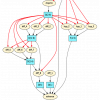Past Research
CAL: Computer Architecture Laboratory for Design Space Exploration
The Computer Architecture Laboratory (CAL) will advance Exascale Design Space Exploration to develop energy efficient and effective processor and memory architecture R&D for DOE’s Exascale program. Read More »
CoDEx: Co-Design for Exascale
The next decade will see a rapid evolution of HPC node architectures as power and cooling constraints are limiting increases in microprocessor clock speeds and constraining data movement. Applications and algorithms will need to change and adapt as node architectures evolve. A key element of the strategy as we move forward is the co-design of applications, architectures and programming environments, to navigate the increasingly daunting constraint space for feasible exascale system designs. We… Read More »
Green Flash
Our researchers have proposed an innovative way to improve global climate change predictions by using a supercomputer with low-power embedded microprocessors, an approach that would overcome limitations posed by today’s conventional supercomputers. Read More »
ExaSAT
Please see our main webpage here. One of the emerging challenges to design HPC systems is to understand and project the requirements of exascale applications. In order to determine the performance consequences of different hardware designs, analytic models are essential because they can provide fast feedback to the co-design centers and chip designers without costly simulations. However, current attempts to analytically model program performance typically rely on the user manually… Read More »
Characterization of DOE Mini-apps
The Computer Architecture Laboratory (CAL) will advance Exascale Design Space Exploration to develop energy efficient and effective processor and memory architecture R&D for DOE’s Exascale program. Read More »
Rambutan
Rambutan is a performance modeling and analysis tool for understanding the behavior of asynchronous, task-based execution models. It consists of a deeply-instrumented runtime that collects statistics during the execution of a task-based application across distributed memory machines. The tool keeps track of application task execution, communication costs, and runtime overheads such as task creation and deletion, queue management, dependency satisfaction (possibly remote), remote data… Read More »
PARADISE
An increasing number of technologies are being proposed to preserve digital computing performance scaling as the benefits of lithographic scaling begin to wane. PARADISE is an open-source comprehensive methodology to evaluate emerging technologies with a vertical simulation flow from the individual device level all the way up to the architectural level. PARADISE can be extended to incorporate new technologies for which a compact model exists. In addition, PARADISE is modular with well-defined… Read More »














